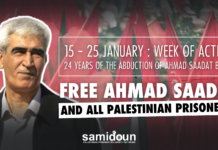by Hind Shraydeh
The following article, by Palestinian writer Hind Shraydeh, was originally published in Arabic at Hadf News:
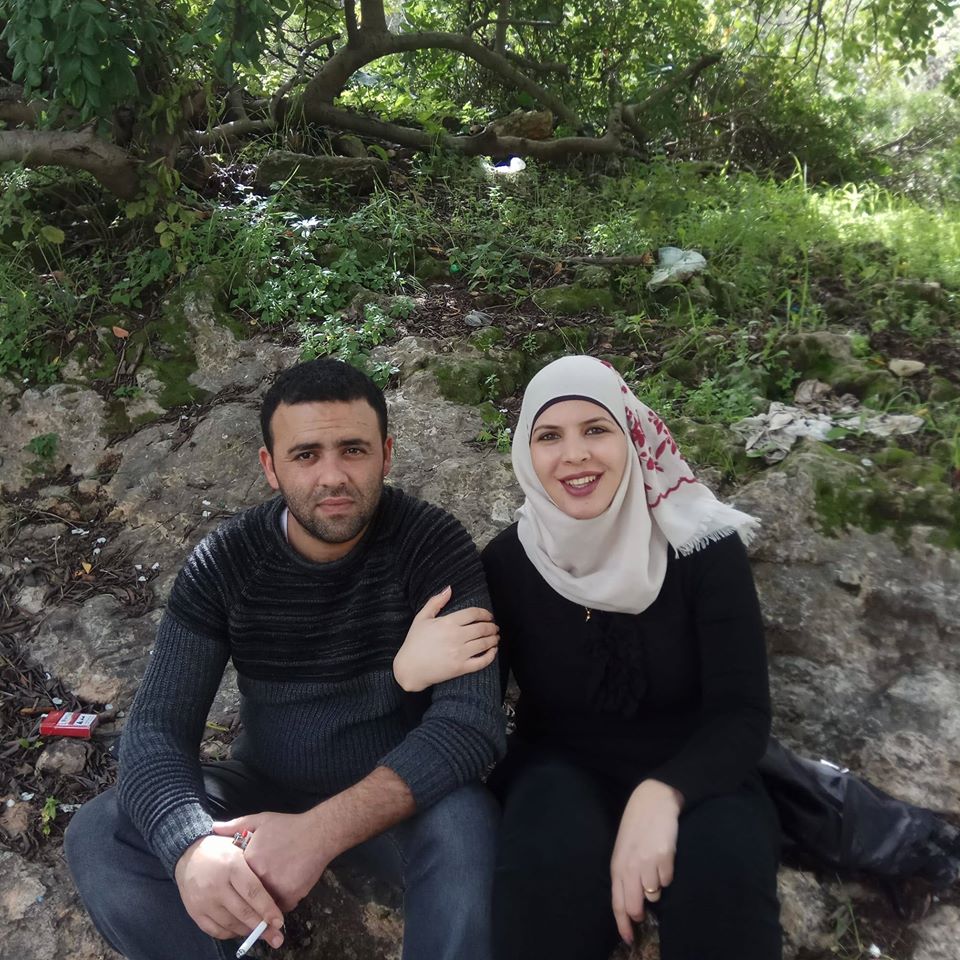
Salam and Rubou’The different meanings of “Peace”
To some who hold power and authority, “peace” is linked with settlement and accommodation, with privileges they aspire to obtain in exchange for crumbs of the historic Palestine. Salam, on the other hand, whose name in Arabic means “peace,” exemplifies another meaning for the term.
Salam Taha was born in the village of Deir Abu Misha’al, situated northwest of Ramallah city. He adores the sea, although he was deprived of enjoying it due to the occupation. Salam usually escapes from the noise of the city to Khirbet Al-Rachniyeh east of the village, to relish the green views of his secret place, gazing towards the occupied Palestinian coast, confronting his feelings with absolute silence, and spending time in spacious verdant fields.
“He is the most shy among us but the bravest too,” says his friend at university.
Arrested while caring for his child
Israeli military soldiers raided Salam’s house after exploding its door to make their entry. They attacked Salam, forcing against the wall and cowardly hitting his body with their rifles.
It was four o’clock in the morning, when Salam was awake caring for his one-month baby, Cana’an. He never knew it is going to be his last turn in the ongoing rotation with his wife, Rubou’ or that he would be unable to look after his child for quite a long time.
Salam was tied to the kitchen chair, while military soldiers ransacked his place, turning it upside down. They were looking for his older mobile phone, which was directly in front of them the entire time, but they claimed not to notice it while acting in such a vicious manner.
Salam remained placid, as if he was unbothered, and mocked the soldiers’ actions, an attitude that angered the chief officer, who tried to provoke Salam by cursing his wife Rubou’ and directing profane insults at her while she prepared some milk for her child to calm his continuous crying during the assault. He stared at the chief officer with a shaming look, as if asking, “Is this the way you are raised to respect mothers?!”
He hummed a melody, with unidentifiable lyrics, repeating the only recognized words of it, which were “you may.”
After the extensive vandalism inside the house, the Israeli soldiers handcuffed Salam’s hands and grabbed him tightly from the shoulders. Rubou’ quickly knelt down on the ground, trying to put her husband’s shoes on with all care and diligence.
Salam saluted her, saying, “It will not take so long… I will come back soon.”
“This is how my husband was abducted on a Friday at dawn, 30 August 2018, only two days before his master’s degree studies commenced, as he was registered in the International Studies Program at Birzeit University,” Rubou’ says.
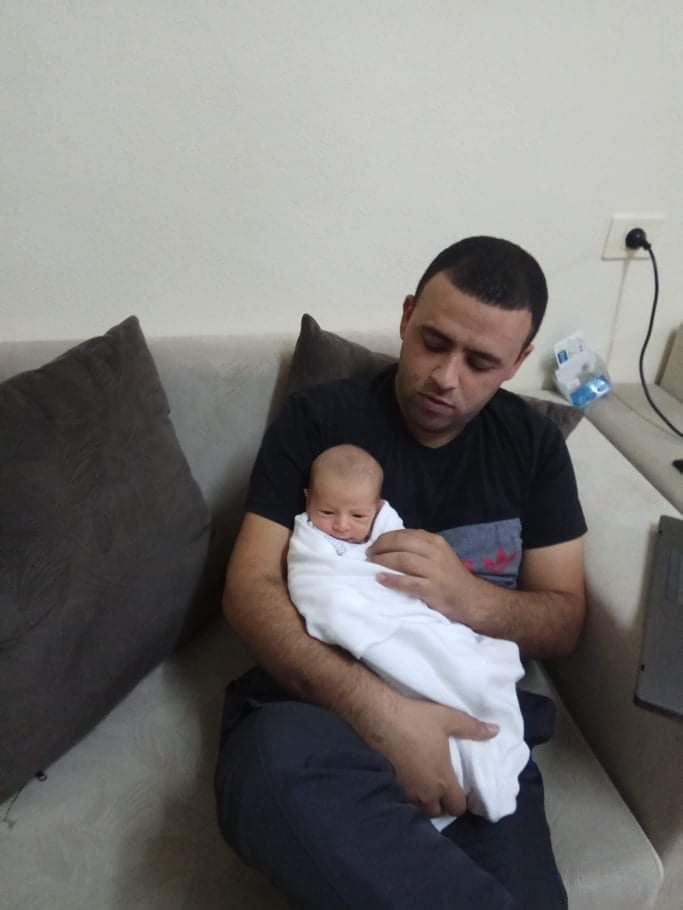
Earning his undergraduate degree with several interruptions
Over 80 students at Birzeit University are currently imprisoned in Israeli prisons. 20 of them are held under administrative detention, without any charges or trial. Their detentions are based on the “predictions” of the area commander of the Israeli military occupation, that these students might pose a “security threat to the state of Israel.” The rest of the students face indictments in military court, mostly revolving around involvement in student activities inside the university.
“Salam earned his BA degree in political science with a minor in public administration. His undergraduate studies were frequently interrupted by arrests, which extended the normal duration required to finish his studies,” Rubou’ stated.
There are students whose first university degree take them double the time they actually need to complete all their university requirements, in addition to courses related to their specialty. Students fail to join their classes, due to their repeated detentions, and yet try hard to resume their studies again at an older age with younger cohorts and sometime different generations than the ones that launched with them their academic journey.
Last week, three more student leaders were abducted by Israeli soldiers, just days before the end of the semester: Izz Shabaneh from the village of Sinjil, Mehdi Karajeh from the village of Saffa, and Basil Barghouthi from the village of Beit Rima.
Salam’s secret weapon
The Sunday after the invasion, Rubou’ knew that her husband is being held at Al-Moskobiyeh interrogation center in Jerusalem, where Salam remained for 46 days of harsh interrogation, during which he was banned from seeing his lawyer. Salam visited Jerusalem not as a tourist visiting the Dome of the Rock or the Holy Sepulcher, but rather stuck in an underground dungeon with numerous torture methods that are hatefully designed in order to drain the prisoner’s will. Fluorescent lights were switched on 24/7, causing him a severe headache and irritating his eyes, coupled with echoes of endless screaming and low temperatures directed on his body by an air-conditioner were only some of the examples of the constant pressure and inhuman treatment.
After three months of detention, Rubou’ decided to take the risk in order to cheer her husband up and transfer to him good feelings to help him stay strong and carry on with a brave heart. She decided to provide her husband with a secret weapon while attending his court session.
How is that possible if even a tissue is not allowed to pass through the punitive inspections and searches?! She took extra care of her outfit, wore her favorite jacket, closed its buttons, and luckily succeeded to pass through the first inspection, the second one through an automatic inspection machine, and the last personal one, that looks like two harassing hands passing an electronic stick over your body. After she waited outside in the cold for hours, the security guard notified Rubou’ that it was time for Salam’s trial. She walked into the court room with her surprise and unbuttoned her jacket, where Salam was able to see his son Cana’an’s smiling face printed on Robou’s T-shirt. For two minutes long, the security guards were frozen in place. They did not know how to deter such a secret weapon!
Rubou’ laughed while recalling the incident, saying: “I felt that we had won a victory … the guards were frozen and did not know what to do! They think they can abolish the longing in our hearts, but we proved them wrong. This was my way of resistance and standing by Salam’s side”.
82 days of harsh investigation in the Al-Moskobiyeh slaughterhouse
“Salam did not sleep for so long, he was immensely pale, and bleeding from his wrists due to the tight shackles around them. The prison administration employed a number of interrogators who created stories and fake scenarios about our family to weaken Salam. Some of their fabrications were about me, his wife, and our son Cana’an, found dead in a car accident, others were about bringing me for interrogation in a room adjacent to Salam’s cell”, Rubou said, recalling what Salam told her in one of her visits.
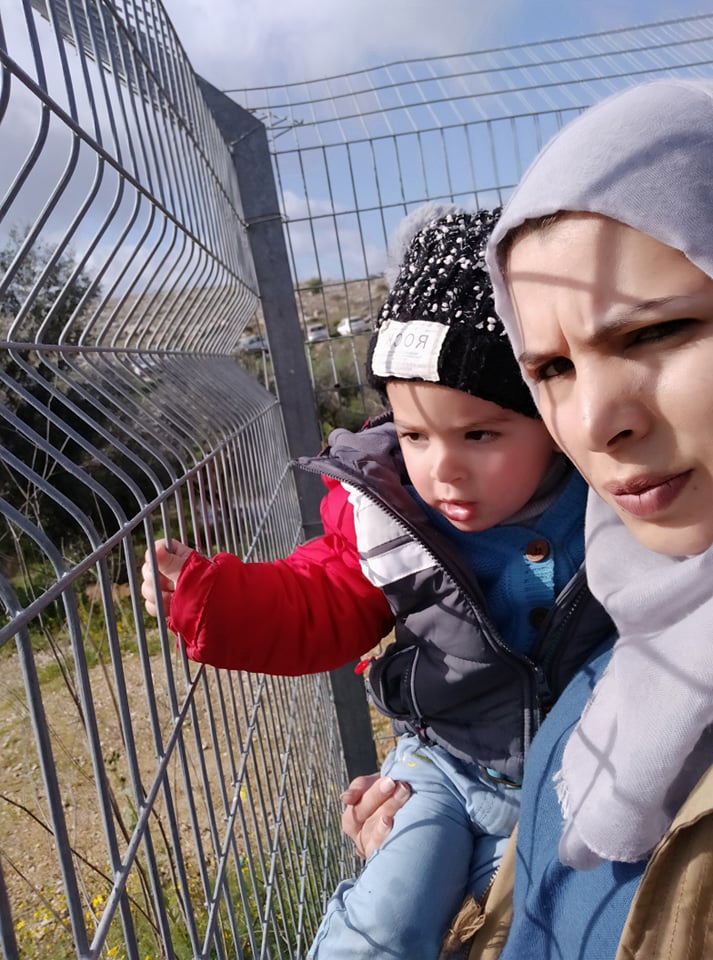
Many deceptions and malicious tricks were practiced by the Israeli intelligence agency, known as the Shabak, in order to put pressure on Salam, with one sole aim: Extracting confessions from him in order to celebrate their delusional victory and prove their domination over Palestinians.
“Before his recent arrest, Salam underwent a colonoscopy, as he suffers from colon problems, stomach pains and hemorrhoids that caused him bleeding during the interrogation. The lawyer submitted Salam’s medical papers explaining his condition, but the fascist regime did not care about his medication, and refused to let him go to the bathroom frequently,” Rubou’ says.
The Israeli occupation deliberately mistreats prisoners, providing them with poor and inadequate health care in an attempt to exhaust the captives. As punishment for Salam’s steadfastness, the illegitimate military court sentenced him to 18 months in prison.
Just two weeks before the end of his sentence, when Rubou’ was wondering about the color of the dress that she planned wear to welcome her partner home, and the unique outfit she is preparing for her son Cana’an to wear, only two weeks before Salam’s sentence ended, the Israeli military forces sent him to the slaughterhouse of Al-Moskobiyeh once again. Salam underwent thirty-six days of cruel interrogation with an agitated and hysterical frequency, during which he was once again prevented from meeting with his lawyer.
Eighty-two days is the cumulative time of interrogation Salam has gone through, while the “civilized” world and the luckier youths of the colonial project live in isolation from the tragedies of the occupation, perhaps by playing soccer or baseball and setting some exciting plans for their travels to the Maldives. Eighty-two days of interrogation, and yet the occupation steals years from Palestinian youth: Their future, their families and their children.
Meanwhile, international human rights organizations act like Pontius Pilate, when he washed his hands of guilt for the blood of Christ. Such organizations’ roles are to adopt “codes of conduct”, or issue informative brochures, or to express their “mild” concerns about a rough death that happened in a sacred spot in the far reaches of the earth, called Palestine.
Salam is still detained without trial in the Eshel desert prison, after he was arbitrarily transferred in mid-March from Ofer prison overnight as a punitive measure, as a result of which he had to sleep a full night in the “Ramla crossing-point”, a place where prisoners are gathered before they are distributed to other prisons. This happened at a time when the occupation claimed to be cautious and to stop unnecessary movement between prisons, in order to prevent the spread of coronavirus.
“You may build a huge wall around me, and another wall around you, the enemy of the sun … Still I will not compromise” lyrics of an Arabic song
Eshel Prison differs in its structure from other prisons; it is more isolated and brutal. The square yard, known as the fora, in which the prisoners spend their outdoor time is covered, so that they do not see the sky at all, nor the sun’s light. It is not available all day, but only for specific hours, and it is also far from the prisoners’ rooms. When released prisoners describe this prison, some say: “The bathroom in Eshel does not accommodate a chubby person, and the showers are narrow. All can be coped with except the climate of the desert, the high humidity and temperature in the morning and extreme cold at night”.
Salam spends most of his time reading and trying to maintain a healthy pattern by playing sports. He keeps humming his favorite song, as he walks in the fora: “You may steal the last inch of my land… You may feed the years of my youth to the prison … You may put down the flame I keep rising… You may prevent me from kissing my mother …You may defeat the dreams I have for tomorrow. You may deprive my children of wearing their Eid holiday outfits… You may build a wall and yet another taller one… In that act you assure to the world that you are the enemy of the sun. Still I will not compromise. Until the last pulse in my veins, I will continue fighting,” an Arabic song by Lebanese singer Julia Butros,
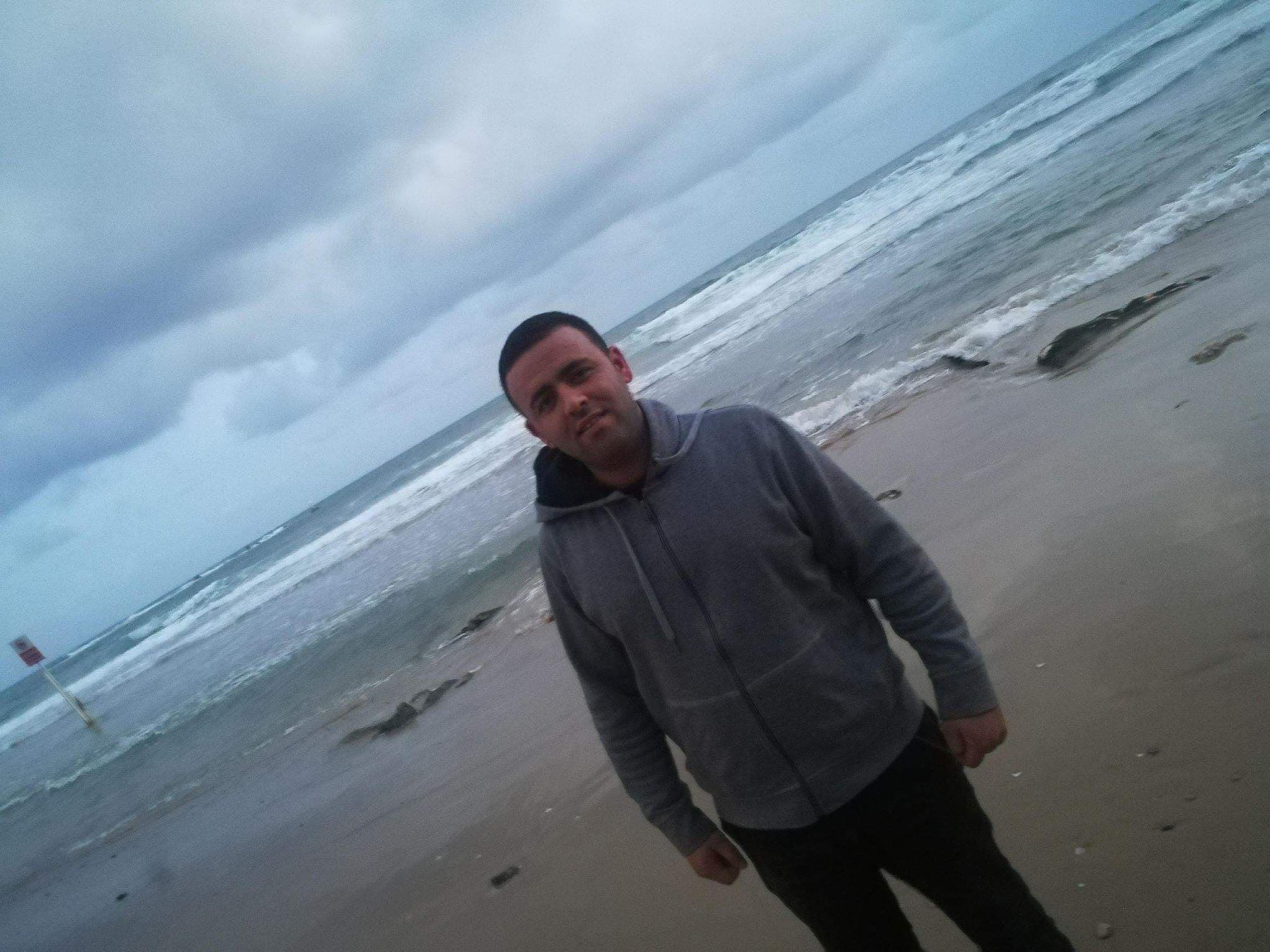
Fatherhood on hold
“It is not easy to raise a child on your own, while the pictures of the baby’s father are hung on the wall”, Rubou’ said. “Cana’an will turn two years old in July, while he does not know his father. I finally obtained a permit to visit Salam after being banned for almost a year. The long-anticipated permit allowed me to visit my husband three times only before the spread of COVID-19, after which visits were suspended.”
“We were born in pursuit of joy, and for joy we die”
“To see my husband in front of me through an insulated partition and isolating glass without being able to touch his hand, and to speak to him through telephones which the jailers control, is not easy at all. This increases the pain in my heart,” Rubou’ says. “Salam and I experienced a beautiful love story at university, which was completed in our marriage, and Cana’an is the fruit of our love.”
“With all the suffering that I live alone with Cana’an, and all the decisions I have to make, serving as mother and father at the same time, I return to remember what we insisted on highlighting in our wedding card. ‘We were born in pursuit of joy, and for joy we die.’ This is our conviction, and this is our belief in which we live every day, and we will raise our children to follow it as well,” Rubou’ concluded.
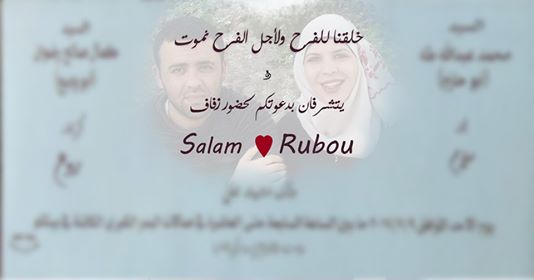
Hind Shraydeh is a Palestinian writer and human rights advocate. She is also the wife of Palestinian prisoner Ubai Aboudi, the Executive Director of the Bisan Center. We encourage you to join the 1 June Day of Action for Ubai Aboudi and to sign the Scientists for Palestine petition supporting him.
Discover more from Samidoun: Palestinian Prisoner Solidarity Network
Subscribe to get the latest posts sent to your email.



